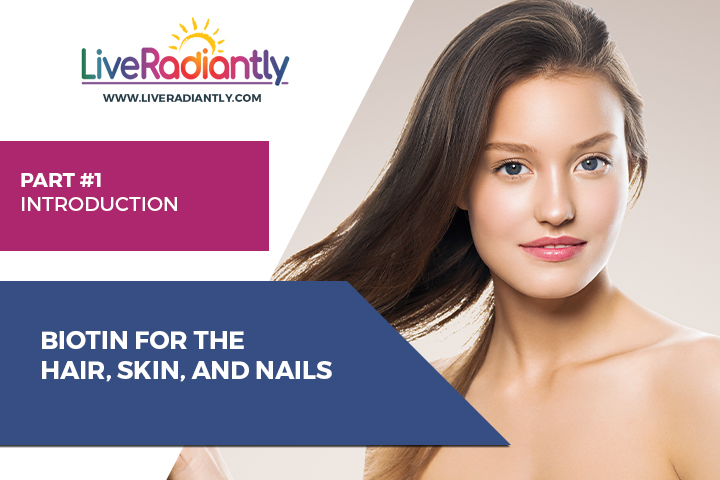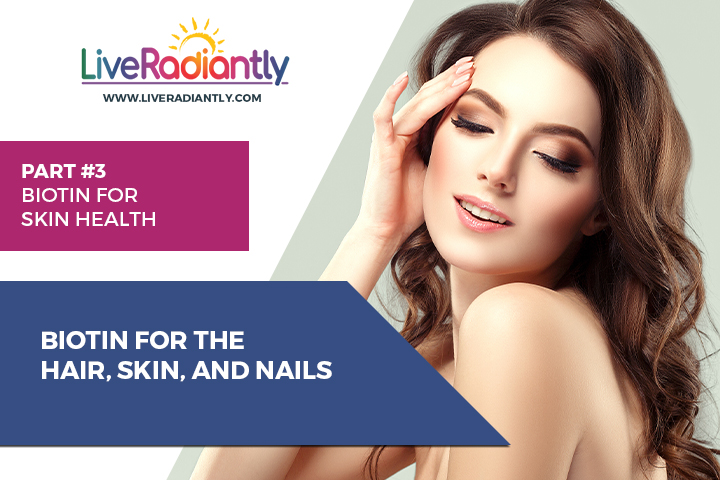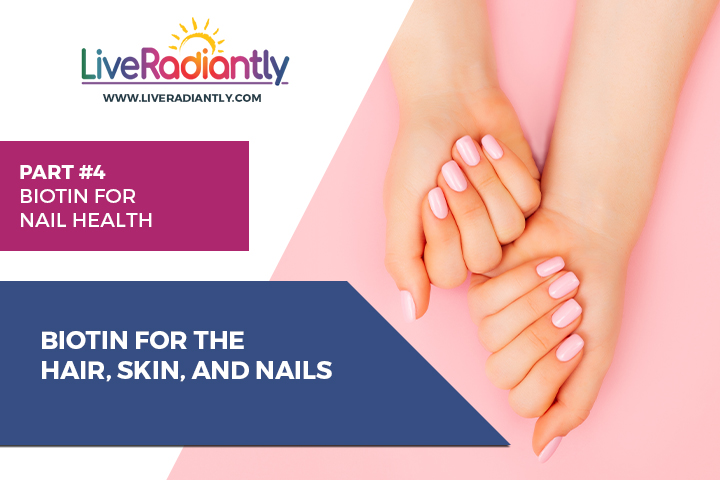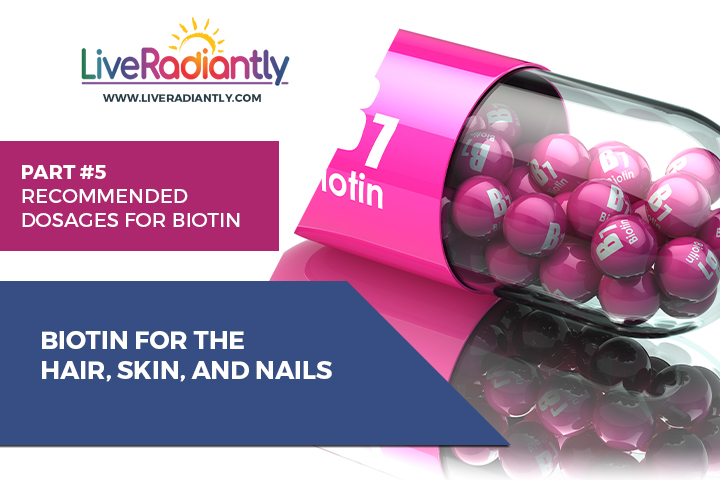We all want healthy hair, skin, and nails that look great, but it can be hard to maintain them. Many of us struggle with brittle nails that break easily, dry skin that is prone to irritation, and dull hair that won’t grow – no matter what we do, our beauty routine isn’t giving us the results we want. Fortunately, there’s a solution!
Biotin is an essential B complex vitamin that helps strengthen and nourish your hair, skin, and nails by playing a role in metabolism and DNA production. By incorporating biotin into your beauty routine through diet or supplements, you can get healthier-looking hair, stronger nails, and glowing skin without any harsh chemicals or treatments. In this article, we’ll discuss the benefits of biotin for your health as well as how to incorporate it into your daily life.

1Introduction
Biotin, also known as vitamin H, is a B complex vitamin that is vital for the health of the hair, skin, and nails. It is a water-soluble vitamin, which means that it is not stored in the body and must be obtained through diet or supplements. Biotin plays an important role in the metabolism of carbohydrates, fats, and amino acids and is also involved in the production of DNA and the functioning of the nervous system.
Biotin is critical for the health of the hair, skin, and nails because it helps strengthen and nourish these tissues. It is necessary for the production of keratin, the protein that makes up the hair, skin, and nails. Biotin deficiency can lead to dry, brittle hair, thinning hair, hair loss, as well as skin rashes, and nail splitting. Adequate biotin intake can help improve the appearance and strength of the hair, skin, and nails.
There are many foods that are rich in biotin, including eggs, nuts, seeds, and legumes. Some of the best sources of biotin include the liver, kidney, and yeast. Other good sources include salmon, avocado, and sweet potato. Whole grains, such as wheat germ and oatmeal, are also good sources of biotin. However, it is vital to note that the bioavailability of biotin can be reduced by the presence of certain substances, such as raw egg whites, which contain a protein that binds to biotin and prevents its absorption.

2Biotin For Hair Health
Biotin is vital for hair growth because it helps strengthen and nourish the hair shaft. Biotin deficiency can lead to dry, brittle hair, thinning hair, and hair loss. Adequate biotin intake can help improve the appearance and strength of the hair. Biotin promotes healthy hair growth by acting as a coenzyme that helps metabolize amino acids, the building blocks of protein. Hair is made up of a protein called keratin, and biotin plays a crucial role in the production of this protein, which helps create strong, healthy hair.
Biotin deficiency is rare, but it can occur in certain individuals who have a genetic disorder called biotinidase deficiency, those who have an overactive gut, or those who have been taking antibiotics for a long period of time. However, biotin deficiency can also occur in individuals who have restrictive diets or have been taking medications that interfere with biotin absorption. Biotin deficiency can lead to hair loss, dry and scaly skin, and brittle nails. It is crucial to note that hair loss can have multiple causes; therefore, consulting a medical professional would be a good first step to identifying the root of the problem.
It’s worth noting that hair growth is a slow process, so it might take some time to see any improvement, even if biotin intake is increased. Therefore, it’s necessary to be consistent with biotin intake and to be patient while waiting for the results. Additionally, it’s crucial to consult a healthcare professional before taking any biotin supplements, especially if you are pregnant or breastfeeding, if you have a medical condition, or if you are taking any medications.

3Biotin For Skin Health
Biotin plays a vital role in maintaining healthy skin by helping strengthen and nourish the skin. Biotin helps improve the skin’s elasticity, making it more resilient and less prone to wrinkles and fine lines. It also helps keep the skin moisturized by promoting the production of natural oils in the skin. In addition, biotin plays a role in the metabolism of fatty acids, which are important for maintaining the skin’s barrier function. This helps keep the skin hydrated and protects it from environmental damage.
While biotin is critical for skin health, there is limited research on its specific effects on acne; however, biotin deficiency has been linked to skin rashes and other skin conditions. Therefore, it is believed that biotin may help improve the appearance of the skin by strengthening the skin’s barrier function and reducing inflammation. Some studies have suggested that biotin supplementation may help improve the symptoms of acne. Eczema is a chronic skin condition that causes dry, itchy, and inflamed skin. Biotin may help improve the symptoms of eczema by strengthening the skin’s barrier function, reducing inflammation, and promoting the production of natural oils in the skin.
Biotin is essential for maintaining healthy skin. Biotin deficiency has been linked to skin rashes and other skin conditions, so it is believed that biotin may help improve the appearance of skin by strengthening the skin’s barrier function and reducing inflammation. If you have any skin condition or are taking any medications, you’ll want to contact a medical professional before taking biotin supplements.

4Biotin For Nail Health
Biotin plays an important role in promoting healthy nails by helping strengthen and nourish the nail plate. Biotin helps improve the nails’ strength and thickness and reduces brittleness. Biotin is a coenzyme that helps metabolize amino acids, the building blocks of protein.
Nails are made up of a protein called keratin, and biotin plays a crucial role in the production of this protein, which helps create strong, healthy nails. Adequate biotin intake can help improve the appearance and strength of the nails. Biotin deficiency can lead to nail fragility and splitting and can cause vertical ridges to form on the nails.

5Recommended Dosages For Biotin
Recommended Dosages For Adults
The recommended daily intake of biotin for adults is 30 micrograms per day. However, some people may require higher doses of biotin to improve the health of their hair, skin, and nails.
Recommended Dosages For Children
The recommended daily intake of biotin for children is dependent on their age, gender, and weight.
The optimal dosage of biotin may vary depending on a person’s age, gender, medical history, and overall health. Factors such as pregnancy, breastfeeding, and certain medical conditions may also affect the optimal dosage of biotin. Additionally, certain medications can also affect the optimal dosage of biotin. As a general rule, it is necessary to consult a healthcare professional to determine the appropriate dosage for each individual.

Conclusion
Biotin, also known as vitamin H, is a B complex vitamin that is essential for the health of the hair, skin, and nails. It helps strengthen and nourish these tissues by playing a role in the metabolism of carbohydrates, fats, and amino acids and by being involved in the production of DNA and the functioning of the nervous system. Biotin promotes healthy hair growth, improves the appearance and strength of the hair, skin, and nails, and can help reduce symptoms of certain skin conditions.
Biotin can be incorporated into your beauty routine by consuming foods that are rich in biotin or by taking biotin supplements. Some good sources of biotin include eggs, nuts, seeds, and legumes. Additionally, it is important to maintain a balanced diet, a healthy lifestyle, and regular exercise to support the overall health of your hair, skin, and nails.
In conclusion, biotin is an essential B complex vitamin that can help you achieve healthier-looking hair, stronger nails, and glowing skin. By incorporating biotin into your beauty routine through diet or supplements, you can nourish and strengthen the health of these tissues without any harsh chemicals or treatments. Remember that while biotin is beneficial for overall health and well-being, it should not be used as a substitute for a balanced diet, healthy lifestyle, and regular exercise!









